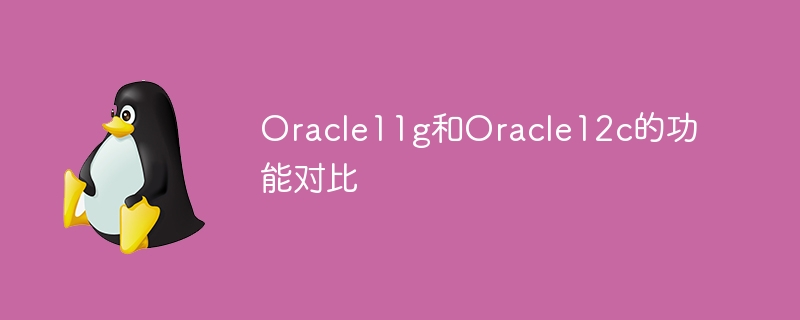

Oracle database is one of the most popular relational database management systems in the world. In recent years, Oracle has successively launched two versions, Oracle11g and Oracle12c. They have many features in common, but also have some significant differences. This article will conduct a comparative analysis of the functions of the two versions and provide some specific code examples to help readers better understand the differences between them.
1. Functional features of Oracle11g:
-- 创建分区表 CREATE TABLE employees ( employee_id NUMBER, last_name VARCHAR2(50), hire_date DATE ) PARTITION BY RANGE (hire_date) ( PARTITION p1 VALUES LESS THAN (TO_DATE('01-01-2010', 'DD-MM-YYYY')), PARTITION p2 VALUES LESS THAN (TO_DATE('01-01-2020', 'DD-MM-YYYY')), PARTITION p3 VALUES LESS THAN (MAXVALUE) );
-- 查看数据库性能报告 SELECT * FROM v$active_session_history WHERE sample_time BETWEEN SYSDATE - 1 AND SYSDATE;
-- 开启透明数据加密 ALTER TABLE employees MODIFY sensitive_column ENCRYPT BY USING 'AES256' ALGORITHM;
2. Functional features of Oracle12c:
-- 创建一个插件数据库 CREATE PLUGGABLE DATABASE pdb1 ADMIN USER pdbadmin IDENTIFIED BY password ROLES = (CONNECT);
-- 创建行级安全性策略 CREATE POLICY p1 ENABLE ON employees FOR SELECT USING (department_id = SYS_CONTEXT('USERENV', 'CURRENT_DEPARTMENT_ID'));
-- 创建包含JSON数据的列 CREATE TABLE json_data ( id NUMBER, data CLOB CHECK (data IS JSON) );
Conclusion:
The above is a brief introduction to the functional features of Oracle11g and Oracle12c, and provides some specific code examples. In general, Oracle12c has greater improvements and innovations than Oracle11g in terms of multi-tenancy, security control and JSON support. Readers can choose the appropriate version according to their own business needs and database management requirements to maximize the potential and advantages of the Oracle database.
The above is the detailed content of Function comparison between Oracle11g and Oracle12c. For more information, please follow other related articles on the PHP Chinese website!




